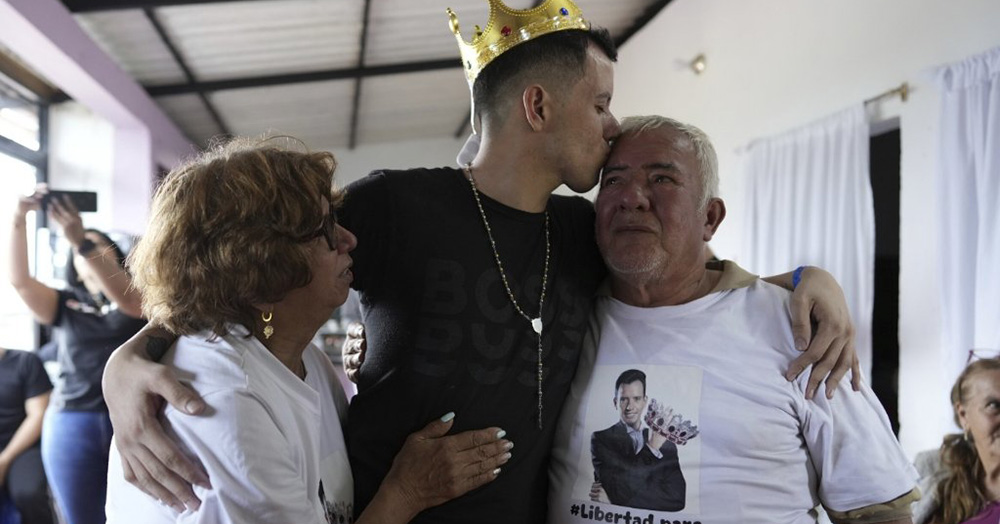Content warning: mentions of sexual and physical abuse and torture.
A gay makeup artist who spent 125 days in a notorious mega-prison in El Salvador has spoken about the alleged sexual and physical abuse he experienced while detained. Andry Hernández Romero was one of over 250 Venezuelan men deported from the US while seeking asylum and sent to CECOT, a terrorism confinement centre, without any legal due process.
Hernández Romero was released from the facility on July 19 and reunited with his parents in Capacho Nuevo on the morning of Wednesday, July 23. He was greeted with a welcome home party, complete with cheering neighbours, a cake and a crown. Hernández Romero was among the deported migrants who were freed as a result of a prisoner swap, which also saw 10 jailed US citizens and permanent residents return to the States.
After arriving in Venezuela, the gay makeup artist described his time in the El Salvador prison as “an encounter with torture and death”. The 32-year-old told journalists that he and others were beaten, shot with rubber projectiles and confined in dark cells.
“Many of our fellows have wounds from the nightsticks; they have fractured ribs, fractured fingers and toes, marks from the handcuffs,” he said, as reported by Reuters. “Others have marks on their chests, on their face… from the projectiles.”
In a televised interview, the man further alleged, “In my particular case, I was sexually abused by the same Salvadoran authorities who guarded us 24 hours a day, 7 days a week.” He added that the migrants believed they would never see their families again.
After wrongful imprisonment, gay makeup artist Andry José Hernández Romero reunited with family after release from notorious El Salvador prison #NOH8 pic.twitter.com/ntPW8nMpj8
— NOH8 Campaign (@NOH8Campaign) July 24, 2025
Following the claims, the Venezuelan attorney general said it will investigate the Salvadoran president, Nayib Bukele, over the alleged torture and abuse of Venezuelan nationals. The US Department of Homeland Security has dismissed the accusations, calling the deported men “criminal, illegal gang members”.
Andry Hernández Romero fled Venezuela in 2024 because he feared persecution for his sexual orientation and because of his opposition to the country’s authoritarian government. He arrived legally in the US with no criminal record, but was detained by Immigration and Customs Enforcement (ICE) after he showed up to an appointment in San Diego arranged for him by the government.
Officers reportedly questioned him about his tattoos—a crown on each wrist with the writing ‘Mom’ and ‘Dad’—under the assumption that they identified Hernández Romero as a member of Tren de Aragua, a violent street gang. The man denied any involvement with the gang, explaining that the artwork symbolised the ‘Three Kings’ festival in his hometown, where he worked in beauty pageants.
Still, he was deported after President Donald Trump invoked the long-unused wartime law, the Alien Enemies Act, which allows the government to expel people without hearings or asylum screenings.
Speaking to KGTV, Melissa Shepherd, an attorney with the Immigrant Defenders Law Center, said, “While we’re happy that he’s no longer in the torture prison, we are worried for his future… They were physically, verbally, and psychologically tortured.”
In a separate statement to the Advocate, ImmDef Co-Founder and CEO Lindsay Toczylowski stated that the case illustrated, “a really dark foreshadowing of where we’re going as a country if this is allowed to stand”.
“These are people who were sent with no due process to be tortured, only to then be used as political pawns in a prisoner release that none of us were privy to before it happened, that none of them consented to being a part of.”
Although having faced such hostile conditions, Hernández Romero said he was moved to learn that people had rallied in support of him. “It fills me with so much peace, so much comfort, so much tranquillity that I was never alone, from day one,” he told Reuters. “There were many people who worried for me.”
© 2025 GCN (Gay Community News). All rights reserved.
Support GCN
GCN is a free, vital resource for Ireland’s LGBTQ+ community since 1988.
GCN is a trading name of National LGBT Federation CLG, a registered charity - Charity Number: 20034580.
GCN relies on the generous support of the community and allies to sustain the crucial work that we do. Producing GCN is costly, and, in an industry which has been hugely impacted by rising costs, we need your support to help sustain and grow this vital resource.
Supporting GCN for as little as €1.99 per month will help us continue our work as Ireland’s free, independent LGBTQ+ media.
